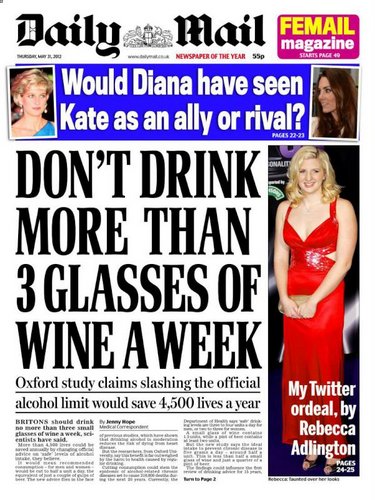 Lots of chat on the internet today about a study that has just been published in the 0pen-access version of the British Medical Journal. (Article is here.) It made front-page headlines in The Daily Mail, a British tabloid newspaper targeted at right-leaning women, and designed to keep its readership in a state of heightened fear about the horrible world we all live in.
Lots of chat on the internet today about a study that has just been published in the 0pen-access version of the British Medical Journal. (Article is here.) It made front-page headlines in The Daily Mail, a British tabloid newspaper targeted at right-leaning women, and designed to keep its readership in a state of heightened fear about the horrible world we all live in.
My interest in alcohol and health is a personal one. I really, really want to know how much wine I can drink without damaging my health. As a man in the over-40 segment of the population (and thus at elevated risk of cardiovascular disease), I am one of the people for whom moderate drinking has been shown to have a protective effect. But I enjoy wine a great deal and drink it every day, so I don’t want to take things too far and end up dying younger than I should.
This study in BMJ Open therefore sounds right up my street. Titled, ‘What is the optimal level of population alcohol consumption for chronic disease prevention in England? Modelling the impact of changes in average consumption levels’, it is authored by British and Australian scientists Melanie Nichols, Peter Scarborough, Steven Allender and Mike Rayner. They’ve used a mathematical model based on data trawled from published meta-analyses (studies summing up other studies) to jiggle around with the figures in order to see the likely impact of higher or lower drinking levels on mortality in the UK.
Some of these studies have shown a benefit from moderate drinking because of reduced risk of heart and circulation diseases. But drinking also increases the risk of death through liver cirrhosis, cardiomyopathy, cancers and accidents. When you dial all these figures into the model and play around a bit, the optimum level of alcohol consumption comes out at half a unit a day. Hence the Daily Mail headlines.
Doing a study like this is problematic in the extreme. Ultimately, the results will only be as good as the meta-analyses themselves in the first place. This study involved feeding in imperfect data: for example, for some of the studies on the incidences of cancer caused by different levels of drinking, smoking was not controlled for. And there will be problems both ways because of confounding. For example, is there something unhealthy about populations who drink more, that could be skewing the data? Do people who drink more eat fewer vegetables? Or exercise less?
Cancers are diseases of ageing. Older people tend to drink more than younger people. Was this controlled for?
And then there’s the reliance in these studies on self-reported drinking behaviour. How many people tell the truth when they are asked by a medical profession about their drinking habits? All these factors will influence the result.
Overall, the tone of the article seems to be profoundly patrician in its anti-alcohol message. This paragraph is telling:
“The model showed no additional benefit to chronic disease mortality if the proportion of the population abstaining from alcohol were to be increased. Results indicated that increasing the proportion of alcohol consumers in the population (drinking moderately) would result in reduced CVD mortality; however, this is of little practical relevance given that there are safer and more socially acceptable means of reducing CVD risk, and there are a number of reasons why it would be imprudent to encourage current non-drinkers to start drinking. These include the following: encouraging abstainers to start drinking while encouraging drinkers to reduce their alcohol consumption is a mixed message that may be difficult to communicate and promote and reducing the number of non-drinkers may have an adverse impact on non-chronic disease health (eg, accidents and injuries).”
It seems to me to be dishonest not to tell people the truth because we are afraid that they might misunderstand it. I acknowledge that this is a difficult discussion on a number of levels, but as a wine lover, and a scientist who has followed the alcohol and health literature for many years, the recommendation of half a unit a day seems at odds with almost every other study I have seen.
However, to their credit, the authors acknowledge the limitations of the study, which is clearly and logically written up. I admire their approach and the thinking behind the study. I just hope that people can see past the newspaper headlines to the detail, because the headlines spell bad news for the wine industry if they are widely accepted by the increasingly powerful anti-alcohol lobby.
It may be that in decades to come, fine wine lovers will be driven to underground tasting clubs where illicit fine wines, a memory of a healthy, culturally rich aspect of society, are consumed in secret, away from the prying eyes of the state.
12 Comments on How much can we drink without risking our health?


“Older people tend to drink more than younger people.”
Really? I was a typical British binge drinker in my teens and 20s, but now have a slightly more responsible attitude. Isn’t this fairly common in Britain?
A meta-meta-analysis. Like you say Jamie, the potential for confounding is enormous, and the conclusions only as strong as all the data feeding into them. Of course, those of us who drink more than .5 standard drinks a day have a motive to discredit.
At any rate, is the quality of a person’s life measured only with regard to longevity and avoidance of illness in later life? Would I stop drinking now if I knew it would add a couple of years at the end? Or lessen my already small risk of certain types of cancer? Unlikely.
I have drunk alcohol just about every day of my life since a teenager. Did a study a few years ago of the number of units Of alcohol I drank in one year. The total was just over 3600 which is equivalent to roughly one bottle of wine per day.
ALthough I no doubt drink far more than is recommended,I balance this with a heathy diet and daily exercise. I also drink plenty of water with my wine.
I get so much pleasure from drinking wine,that even if it causes me to loose a few years of life in old age,it is well worth it.
0.5 a unit a day ????
Surely that would lower one’s life expectancy because of the boredom and depression……..
Seriously though, I find it quite ironic that newspapers runs such a story when they so heavily advertise the supermarket bargain deals on wine, spirits, cider and beers.
At the risk of seeming trivial I like this idea: It may be that in decades to come, fine wine lovers will be driven to underground tasting clubs where illicit fine wines, a memory of a healthy, culturally rich aspect of society, are consumed in secret, away from the prying eyes of the state.
This sounds like a movie plot – a cross between The Matrix and Sideways/Bottleshock!
What is interesting is the first line of the paragraph you quoted: The model showed no additional benefit to chronic disease mortality if the proportion of the population abstaining from alcohol were to be increased.
IOW if we increase the number of people not drinking there is no benefit!
As a GP I decided to stop reading the Daily Mail years ago as it is my opinion that their health reporting is the worst of all British newspapers (and the others aren’t great). But back to the study itself, surely they do not expect GPs to suggest people drink no more than half a small glass of wine or a 1/4 pint of beer in any one session. That is plainly ridiculous and does not help us in any way to deliver sensible, acceptable health messages. I drink a few times a week, usually well under 21u a week. That is manageable.
Surely people should get to know over time how much alcohol they can enjoy without it having a negative effect on their lives and health.
Our bodies all cope with alcohol differently. One glass might be enough to give some a headache, whilst it might take a bottle or more for others.
I think we should all be encouraged to listen honestly to our bodies. Get to know personal limits. All these government guidelines that change from year to year do get confusing for some and people rely and worry about them too much.
Hi Jamie,
I love the blog but I think this is a little rich, coming from you:
“The Daily Mail, a British tabloid newspaper targeted at right-leaning women, and designed to keep its readership in a state of heightened fear about the horrible world we all live in”
Don’t you right a column for The Sunday Express????!!!!!
(Note to anyone unfamiliar with British newspapers, The Sunday Express is like an even more rabid version of The Daily Mail, but with more cod-scientific scaremongering/conspiracy theory stories and far less journalistic integrity. Jamie’s column is good though)
Sorry, I mean “write”, not “right”
Surely this is just yet another example of dumbing down from the mainstream press, creating sound-bites and headlines! There are obviously many, many factors that influence one’s health and longevity, like diet, physical exercise, genetic heritage, personal circumstances, etc, and it can’t all just be reduced to a measure of X units/day!
I’m pretty sure that if I were actually to bother to go read the original article, the negative emotions provoked within me would reduce my health and lifespan more than say consuming a whole bottle of fine wine!!! 🙂
With regards to Cherie’s post, I agree that the messages can be confusing (though the 14u for women and 21u for men have been around for a while). However, the harms that health professionals are worried about are not just the acute effects such as hangovers and drunkenness but also the long term effects of an increased risk of liver disease, brain and nerve disease (all mainly in heavy drinkers) and various cancers (which can be increased by moderate over-indulgence). These risks are measured at a population level and individuals need to make a judgment about the risk for themselves.
Is the celebrity diet we recommended last week killing you?